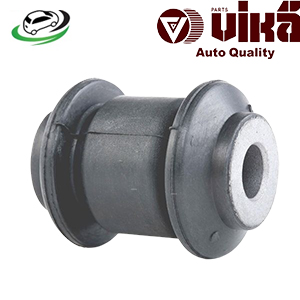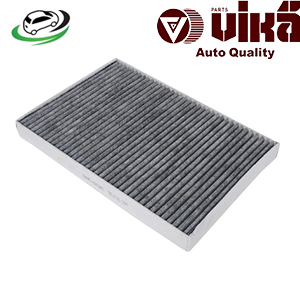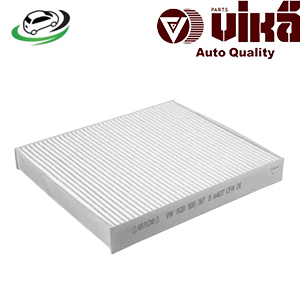-20%
Get VW Polo Cabin Filter 6Q0820367B
The cabin filter is a crucial yet often overlooked component of modern vehicles. Its primary function is to filter the air that enters the vehicle’s cabin through the heating, ventilation, and air conditioning (HVAC) system. By trapping dust, pollen, and other airborne contaminants, the cabin filter ensures that passengers breathe cleaner air and contributes to the overall comfort of the vehicle. In this detailed explanation, we’ll explore the function, importance, types, signs of a dirty filter, maintenance, and how it impacts the overall health of the vehicle and its occupants.
Function of the Cabin Filter
- Air Filtration: The primary role of the cabin filter is to filter out particulate matter such as dust, dirt, pollen, and other allergens from the outside air before it enters the cabin. The HVAC system draws air from the environment, and without the cabin filter, this air would carry contaminants directly into the passenger compartment.
- Improved Air Quality: The cabin filter ensures that passengers breathe cleaner air by trapping pollutants like exhaust fumes, smog, and other airborne toxins that are prevalent in urban areas or during heavy traffic. This is especially important for passengers who suffer from allergies, asthma, or other respiratory issues.
- HVAC Protection: The cabin filter also helps protect the vehicle’s HVAC system by preventing debris from accumulating on the evaporator and heater cores. A clogged HVAC system can reduce its efficiency and lead to costly repairs if debris buildup isn’t addressed.
- Odor Control: Some cabin filters, particularly those lined with activated charcoal, also help reduce odors from entering the cabin. These filters can neutralize unpleasant smells such as exhaust fumes or musty odors from outside, contributing to a more pleasant cabin environment.
Importance of the Cabin Filter
The cabin filter plays an essential role in maintaining not only comfort but also the overall health and safety of the vehicle’s occupants. Here’s why the cabin filter is an integral part of vehicle maintenance:
- Health Benefits: The cabin filter is particularly important for individuals who suffer from respiratory conditions like asthma or allergies. By filtering out allergens, dust, and pollutants, it improves the air quality inside the vehicle, reducing the risk of triggering symptoms.
- Enhanced Comfort: A clean cabin filter ensures that air flows freely through the HVAC system, providing a steady stream of filtered, fresh air. Without a properly functioning cabin filter, passengers may experience unpleasant odors, reduced airflow, or a stuffy environment.
- System Efficiency: A clogged or dirty cabin filter restricts airflow through the HVAC system, causing the blower motor to work harder to push air through. This can reduce the overall efficiency of the heating and cooling system, leading to slower defogging or heating of windows and diminished cooling performance in hot weather.
- Prevention of Long-Term Damage: Dirt and debris can accumulate in the HVAC system if the cabin filter is not regularly replaced. Over time, this can lead to damage to the blower motor, evaporator, or heater core. Repairing or replacing these components can be costly, but regular cabin filter maintenance can help prevent such issues.
- Fuel Efficiency: Although the cabin filter does not directly affect the engine, a clogged filter can force the HVAC system to work harder, which may lead to increased fuel consumption. Ensuring that the filter is clean helps maintain optimal HVAC performance, which can indirectly contribute to better fuel efficiency.
Types of Cabin Filters
Cabin filters come in various types, each designed for different levels of air filtration and air quality improvement. Understanding the types of cabin filters available can help vehicle owners choose the right one for their needs.
- Particulate Cabin Filters: These are the most common type of cabin filters and are designed to trap dust, dirt, pollen, and other large particles. They are typically made of pleated paper or cotton and provide basic filtration. These filters are sufficient for general use and offer an affordable option for most vehicle owners.
- Activated Carbon (Charcoal) Cabin Filters: Activated carbon filters offer an additional layer of filtration beyond just particles. They are designed to absorb and neutralize odors and gases such as exhaust fumes, smog, and ozone, improving air quality inside the cabin. These filters are ideal for vehicles that frequently drive in high-traffic areas or regions with poor air quality.
- Electrostatic Cabin Filters: Electrostatic filters use static electricity to attract and capture smaller particles such as fine dust, mold spores, and bacteria. These filters are especially useful for individuals with severe allergies or respiratory conditions as they provide a higher level of filtration compared to standard particulate filters.
- HEPA Cabin Filters: High-Efficiency Particulate Air (HEPA) filters provide the highest level of air filtration available in cabin filters. They are capable of trapping up to 99.97% of particles as small as 0.3 microns, including bacteria, viruses, and ultrafine dust. HEPA filters are ideal for those who prioritize maximum air cleanliness but tend to be more expensive than other options.
Signs of a Dirty or Clogged Cabin Filter
Like any filter, cabin filters become less effective over time as they accumulate debris and contaminants. It’s important to recognize the signs of a dirty cabin filter so it can be replaced before it causes further issues.
- Reduced Airflow: One of the most common signs of a clogged cabin filter is reduced airflow from the vents, even when the HVAC system is set to its highest setting. A dirty filter restricts the flow of air, making it harder for the system to cool or heat the cabin effectively.
- Foul Odors: If unpleasant smells are coming from the vents when the HVAC system is in use, it could be a sign that the cabin filter is dirty. Filters that have accumulated debris, moisture, or mold can contribute to musty or foul odors in the cabin.
- Increased Dust Inside the Vehicle: A dirty cabin filter may not effectively trap dust and particles, resulting in an increase in dust buildup on the dashboard, seats, and other interior surfaces.
- Foggy Windows: A clogged filter can reduce the efficiency of the HVAC system, making it more difficult to quickly defog or defrost windows. If your vehicle’s windows are fogging up more often than usual, it could indicate that the cabin filter needs to be replaced.
- Unusual HVAC Noises: If you notice unusual noises coming from the blower motor, it may be struggling to push air through a clogged filter. This extra strain on the motor can lead to mechanical issues if the filter isn’t replaced in a timely manner.
Cabin Filter Maintenance and Replacement
Regular maintenance and timely replacement of the cabin filter are essential for ensuring that your vehicle’s HVAC system continues to function efficiently and that the air inside the cabin remains clean.
- Replacement Interval: Most manufacturers recommend replacing the cabin filter every 12,000 to 15,000 miles or once a year, depending on driving conditions. However, if you frequently drive in areas with high levels of pollution, dust, or allergens, you may need to replace the filter more frequently.
- Inspection: It’s a good idea to inspect the cabin filter periodically, especially if you notice any of the signs mentioned earlier. The filter can usually be accessed by removing the glove box or a panel under the dashboard, depending on the vehicle’s make and model.
- DIY vs. Professional Replacement: Replacing a cabin filter is typically a straightforward process that many vehicle owners can do themselves. However, if you’re unsure or uncomfortable with accessing the filter, a professional mechanic can handle the replacement during routine maintenance or an oil change.
- Choosing the Right Filter: When replacing the cabin filter, it’s important to choose the right type based on your needs and driving conditions. If you drive in urban areas with heavy traffic, an activated carbon or HEPA filter may provide better protection against pollutants. For general use, a standard particulate filter is usually sufficient.
Consequences of Neglecting Cabin Filter Replacement
Neglecting to replace the cabin filter when needed can lead to a variety of issues that affect both the vehicle and its occupants:
- Poor Air Quality: A dirty cabin filter cannot effectively filter out pollutants, leading to poorer air quality inside the vehicle. This can be particularly problematic for passengers with respiratory conditions or allergies, as they may be exposed to higher levels of allergens, dust, and fumes.
- Reduced HVAC Efficiency: A clogged filter restricts airflow through the HVAC system, making it work harder to achieve the desired temperature. This not only reduces the comfort of the vehicle’s occupants but also increases the wear and tear on the system, potentially leading to costly repairs.
- Increased Energy Consumption: When the HVAC system has to work harder due to a clogged filter, it consumes more energy, which can lead to slightly higher fuel consumption. While the impact on fuel efficiency may be minimal, it’s still an unnecessary waste of resources.
- Potential HVAC System Damage: Over time, debris buildup in the HVAC system can cause damage to components such as the blower motor, evaporator, or heater core. Replacing these components can be expensive, but regular cabin filter maintenance can help prevent such issues.
Conclusion
The cabin filter is a small but essential part of any vehicle’s HVAC system. It plays a crucial role in ensuring that passengers breathe clean air and that the HVAC system functions efficiently. Regular inspection and replacement of the cabin filter help maintain optimal air quality, improve comfort, and prevent damage to the vehicle’s ventilation system. By understanding the function and importance of the cabin filter, vehicle owners can take proactive steps to ensure their vehicle remains a healthy and comfortable environment for all passengers.
Follow us on Facebook for more parts.




Reviews
Clear filtersThere are no reviews yet.